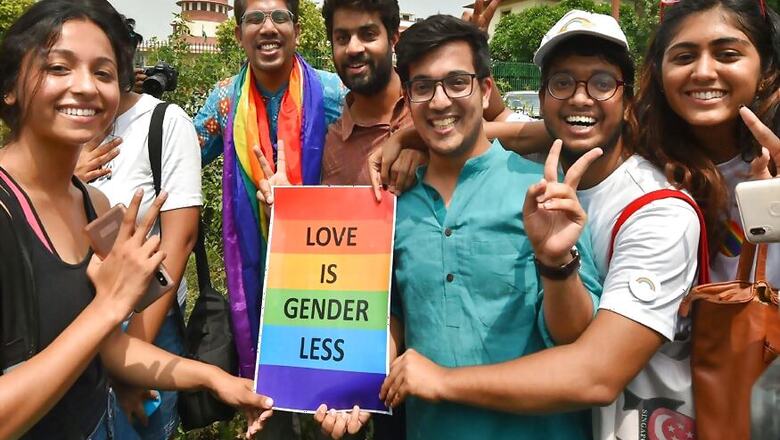
views
Section 377 verdict LIVE Updates: The Supreme Court on Thursday decriminalised consensual sex between homosexuals and read down Section 377 of the IPC. “The ideals of individual autonomy must be preserved. We have to bid adieu to stereotypes and prejudices. Constitutional morality must guide us all,” Chief Justice of India Dipak Misra said. The SC said momentous walk of freedom can be realised when each one of us acknowledges LGBT community possesses the same rights. “We have to bid adieu to stereotypes and prejudices,” said the apex court, adding that intimacy and privacy was a matter of choice while “prejudice and social stigma still affects a certain section of society.”
A five-judge Constitution bench headed by Chief Justice Dipak Misra termed the part of Section 377 of the Indian Penal Code which crimiminalises unnatural sex as irrational, indefensible and manifestly arbitrary. The bench, which also comprised Justices R F Nariman, A M Khanwilkar, D Y Chandrachud and Indu Malhotra, read down Section 377 as being violative of right to equality. The top court, in four separate but concurring judgements, set aside its own verdict in the Suresh Kaushal case. Justice Chandrachud asks medical community to sensitise itself about rights of LGBTQ community. Instead of trying to change what is not a disease, counsellors must wake up to these rights
Section 377 refers to ‘unnatural offences’ and says whoever voluntarily has carnal intercourse against the order of nature with any man, woman or animal shall be punished with imprisonment for life, or with imprisonment of either description for a term which may extend to 10 years, and shall also be liable to pay a fine. The apex court, however, said other aspects of Section 377 of IPC dealing with unnatural sex with animals and children shall remain in force.
The historic judgement came on a batch of writ petitions filed by dancer Navtej Jauhar, journalist Sunil Mehra, chef Ritu Dalmia, hoteliers Aman Nath and Keshav Suri and business executive Ayesha Kapur and 20 former and current students of the IITs. They had sought decriminalisation of consensual sex between two consenting adults of the same sex by declaring Section 377 illegal and unconstitutional.
The issue was first raised by the NGO, Naaz Foundation, which approached the Delhi High Court in 2001. The Delhi High Curt had in 2009 decriminalised sex between consenting adults of the same gender by holding the penal provision as “illegal”.
This high court judgement was overturned in 2013 by the apex court which also dismissed the review plea against which the curative petitions were filed which are pending. The writ petitions were opposed by Apostolic Alliance of Churches and Utkal Christian Association and some other NGOs and individuals, including Suresh Kumar Kaushal.
Read all the Latest News , Breaking News , watch Top Videos and Live TV here.


















Comments
0 comment